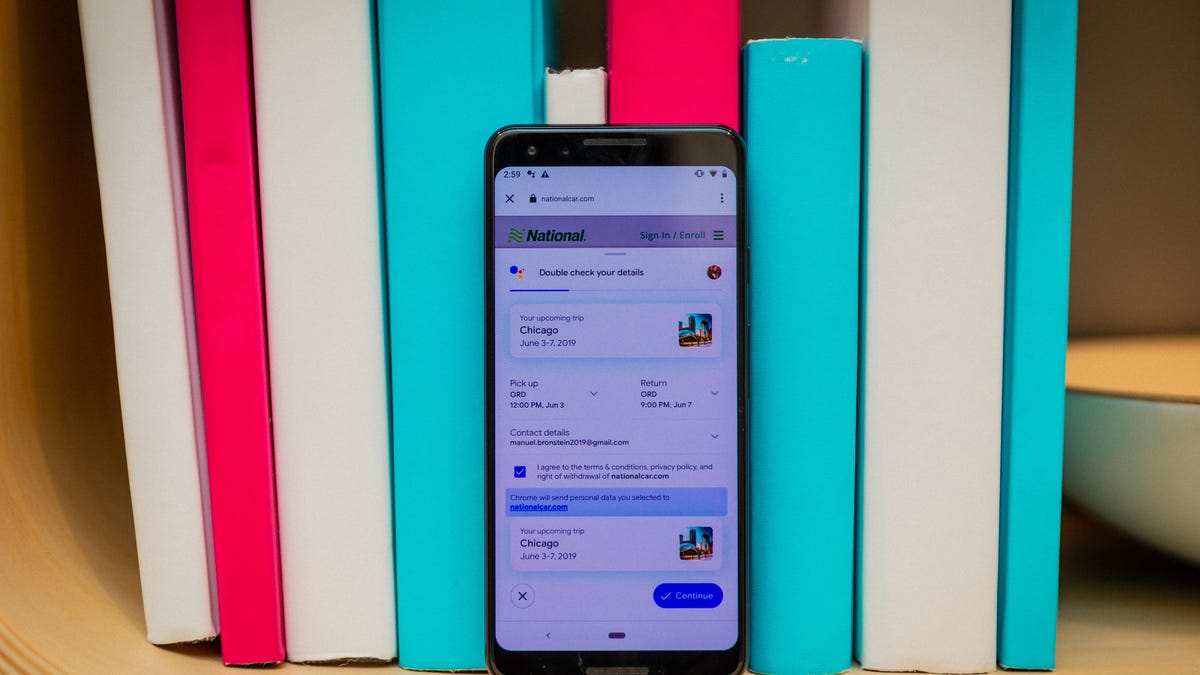Google Duplex is less creepy assistant and more autofill on steroids
There was little mention of the human-sounding assistant.

Google Duplex's new update is like autofill on steroids.
Last year, Google stoked intense controversy when it announced Duplex, a technology that uses eerily human-sounding artificial intelligence software to book restaurant reservations and hair appointments. Immediately, the project spurred a debate over ethics in artificial intelligence and generated fear over a robot's ability to deceive people.
Now Google is unveiling its follow up -- and it's a lot less disturbing.
At the company's I/O developer conference on Tuesday, the search giant announced an update to Duplex called "Duplex on the Web" that'll allow it to make more types of bookings. Now it will also be able to handle car rentals and movie tickets.
But this one doesn't involve speech-mimicking robots that spark debate over AI ethics. It's basically like autofill on steroids. It automates the process of filling out forms you'd find on the mobile web.
Here's how it works: You'd say something like, "Hey Google, get me a rental car from National for my next trip." The Assistant then pulls up National's website on your phone and starts filling out the fields in real time.
Throughout the process you see a progress bar, like you'd see if you were downloading a file. Whenever the system needs more information, like a price or seat selection, the process pauses and prompts you to make a selection. When it's done, you tap to confirm the booking or payment.
The system fills out the form by using data culled from your calendar, Gmail inbox and Chrome autofill (like your credit card information and login info). The update will launch later this year on Android phones.
The new Duplex announcement is much tamer than last year's debut, which freaked out audiences from the very moment Google CEO Sundar Pichai presented the demo. The artificial intelligence software is patterned after human speech, using verbal tics like "uh" and "um." It speaks with the cadence of a real person, pausing before responding and elongating certain words as though it's buying time to think.
The tech brought to life a vision of what a voice assistant could sound like in the future: Natural and lifelike, instead of the semirobitic, disembodied voice you hear coming from a Google Home or Amazon Echo today.
The demo immediately raised flags for AI experts, industry watchers and consumers, who worried about the ethics of creating robots that could fool people into thinking they were talking to other humans. Google later said it would build in disclosures so people would know they were talking to automated software. Now the feature is available on both Android phones and iPhones, in 43 states.
Still, the visceral backlash was a key moment for Google, Scott Huffman, head of engineering for the Google Assistant, told me earlier this year. "The strength of the reaction surprised me," he said. "It made it clear to us how important those societal questions are going forward."
The new update also redefines how Google is thinking of Duplex. It's not just the name of the search giant's human-sounding AI. It's more of a class of software that helps with performing tasks, and for now that's booking -- whether it's over the phone, on the web or somewhere else in the future.
"The way we think about Duplex, in broad strokes, it's a model of technology that allows us to automate tasks," Manuel Bronstein, vice president of product for the Assistant, said in an interview last week. "It just happens to be that the first task that we showed to automate was making a phone call to a restaurant."
Originally published at 10:25 a.m. PT.

